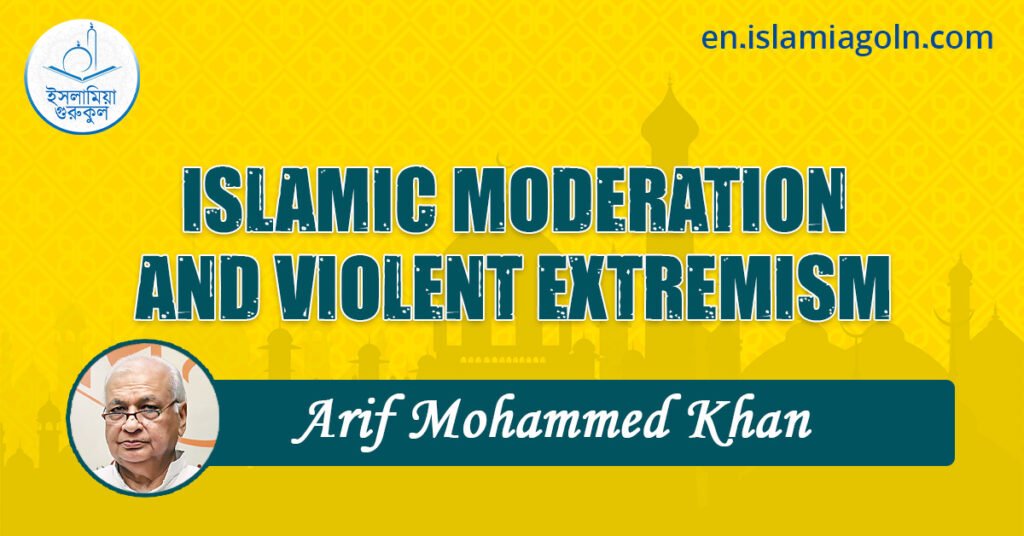Today’s Topic of Discussion: ISLAMIC MODERATION AND VIOLENT EXTREMISM
ISLAMIC MODERATION AND VIOLENT EXTREMISM
One of the basic principles of conduct and morality that Islam has steadily tried to inculcate is to shun extremism and adopt a moderate or justly balanced approach in religion and in personal behaviour. The Quran says: Thus have We made of you, a group justly balanced that you might be witnesses over the nations and the Apostle a witness over yourselves (2.143).
It is important to note that the Arabic word used in this verse is “Wasata’ which means to take middle course and avoid extravagance on either side. Further, the term ‘witness’ lends weight to the argument, as it presupposes ‘trustworthiness’ and ‘credible impartiality’ to assist the course of justice by offering truthful and informed evidence.
Imam Malik has reported a prophetic narration saying that ‘Every religion has an innate character. The innate character of Islam is modesty (Muwatta 47.9). Imam Ahmad and Imam Nasai have reported another tradition that says: ‘Distance yourself from being extremist in religion’ Imam Bukhari in his collection has reported a Hadith saying that ‘the religion is indeed easy, but it becomes difficult for one who is overly strict in it’ Commenting on this Hadith Ibn Hajar Asqalani has said that ‘the meaning is that, one who in his religious practices neglects modesty, shall be incapacitated, worn out and eventually overwhelmed’.
In another important narration the Holy Prophet advised to ‘do good deeds properly, sincerely and moderately and receive good news because one’s good deed alone will not entitle him to enter paradise. Someone asked ‘Even you, O Messenger of God’ He said, ‘Even I, unless God bestows His pardon and mercy on me’ (Bukhari 8.474)
The important point here is that moderation as a method has been prescribed both in undertaking devotional exercises and performance of good deed. The Quran itself has more than two dozen verses highlighting the importance of the virtue of moderation and strongly denouncing extremist behaviour in religion or other matters.
The history of first thirteen years of Islam, that is before migration to Medina, is a chilling account of severe persecution and oppression of the Prophet and his small band of followers in Makka. After migration even Medina came under threat and two years later when the first permission to fight back the oppressors came, it was no carte blanche The Quran told the oppressed in clear terms to ‘fight in the way of God those who fight you but do not transgress limits, for God loves not transgressors. (2190)
The exhortation against ‘no holds barred’ attitude in settling old accounts was further reiterated by Quran and it said: if you do catch them out catch them out no worse than they catch you out but if you show patience that is indeed the best (course) for those who are patient (16.126) Not just that. The Quran further said: ” let not the hatred of some people in (once) shutting you out of the Sacred Mosque lead you to transgression. Help you one another in righteousness and piety not in sin and rancour (5.2)
But these sublime injunctions against extremism or emphasis on moderation need not create any illusion that the violent extremism of certain Islamist groups (not Islamic) is a product of recent times rooted in misinterpretation of Islamic text or some context that creates deep sense of frustration on account of certain policies and actions of the powers that sponsor and patronise oppressive regimes in many Muslim countries.
The fact is that violent extremism was the dominant norm of the pre-Islamic Arab Jahiliyya society and Islam had sought to replace it by liberal moderation. The history shows that this violent extremism did not take long to resurrect itself after the death of holy Prophet in AD 632 The third Caliph Usman was killed by a Muslim mob in AD 656 and five years later in AD 661, the fourth Caliph Maula Ali became victim of an assassin who belonged to a violent extremist group known as Khawarij in the history of Islam.
The sad part is that not only certain groups and individuals resorted to violent extremism to give vent to their disaffection but the successive governments also used this weapon to eliminate all such persons whom they viewed as potential threat to their power. In year 680, the large army of Yazid wiped out almost all the male members of the family of Holy Prophet including his grandson Imam Husain. The violent extremism of pre-Islamic Jahilliya that created havoc in the plains of Karbala continues to be a threat to Islamic values and humanity at large.
See more:

